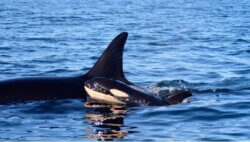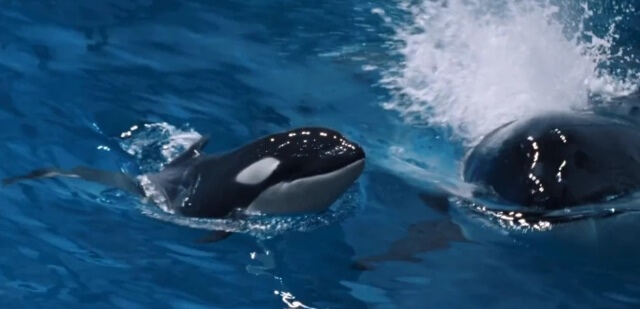“It’s a boy!” newspapers on the West Coast exclaimed when photos from biologist Maya Sears, taken in the Salish Sea, off the coast of Seattle, showed a baby orca, no more than two or three days old and still carrying around his umbilical cord.
Officially designated J-60, the newest member of the J pod of the Southern Resident orcas will soon receive a proper name courtesy of the Whale Museum on San Juan Island, which gathers votes from the local whale lovers.

Photo of J-60 by Maya Sears under NMFS Permit 27052
Scientists are celebrating the news of the birth cautiously: Many baby orcas do not survive long due to toxic pollution and a lack of chinook salmon to eat. J-60’s mother is believed to be a first-time mother, which would mean her mother’s milk may have accumulated a significant dose of pollutants over the course of her 19-year life. But she’ll also be getting a significant dose of love and support from her family members, who will be guiding her through everything she needs to know about caring for her newborn. Orca life is all about family.
The same is not the case on the other side of the world at the Moskvarium Aquarium in Russia, where 11-year-old orca Naya has just given birth to a daughter. According to a post on the Moskvarium’s Instagram:
“After 10 hours of hard labor … our specialists delivered Russia’s first killer whale birth in an artificial habitat. It was not easy, but thanks to teamwork everything ended well … Now the main task is for Naya to recover from difficult birth, to establish milk feeding, and the cub to develop without abnormalities and get stronger.”

Photo of Naya and her daughter by Moskvarium.
Life has already been hard for Naya. Last year, her two tank mates, Narnia and Nord, died early deaths. The Moskvarium then announced they would no longer participate in the capture of marine mammals from the ocean:
“Employees of the Moskvarium Center for Oceanography and Marine Biology, as the country’s leading experts in their field, took part in the development of draft law N40333-8 “On Amendments to the Federal Law in Fisheries and the Conservation of Aquatic Biological Resources”, advocating a complete ban on the extraction (catch) of marine mammals for cultural and educational purposes.”
Neuroscientist Dr. Lori Marino, President of the Whale Sanctuary Project, notes that neither the newborn nor her mother will have the kind of loving family support that J-60 and her mother are experiencing in a natural environment, surrounded by their large extended family.
“The little orca in Puget Sound came into a world filled with love and support from his mother and relatives, a large extended family. He will enjoy being part of a vibrant Southern Resident orca community. He will learn how to be an orca amidst the safety of his social group, and he can look forward to being part of a multi-generational population of orcas who will travel together, play together and help each other.
“Naya’s daughter will have none of that. She is born into an impoverished empty world with only her young inexperienced mother as support and nothing to do and no one to play and socialize with. She and her mother have a bleak future unless they are transferred to a sanctuary.”
We wish both newborns good health and long life. And our special wish for Naya and her daughter is that as the sanctuary movement spreads around the world, they will both have the opportunity to be retired from the misery of life in a concrete tank.